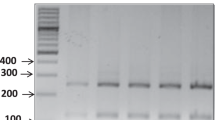Abstract.
Thirteen blood samples of horses from South Africa, five of which were seropositive for Babesia caballi and eight for both B. caballi and Theileria equi, were subjected to in vitro culture to identify carrier animals. None of the animals had a detectable parasitaemia on Giemsa-stained blood smears before culture initiation. Cultures were initiated in L-cysteine-enriched medium, either in an oxygen-reduced gas mixture or in a 5% CO2-in-air atmosphere. All five animals seropositive for B. caballi were identified as carrier animals using an oxygen-reduced atmosphere, whereas only four samples became culture positive under normal atmospheric conditions. Among the eight samples seropositive for both B. caballi and T. equi, two were identified as carriers for both. The remaining six samples were identified as carrying only T. equi.
Similar content being viewed by others
Author information
Authors and Affiliations
Additional information
Electronic Publication
Rights and permissions
About this article
Cite this article
Zweygarth, E., Lopez-Rebollar, L.M., Nurton, J. et al. Culture, isolation and propagation of Babesia caballi from naturally infected horses. Parasitol Res 88, 460–462 (2002). https://doi.org/10.1007/s00436-002-0609-4
Received:
Accepted:
Issue Date:
DOI: https://doi.org/10.1007/s00436-002-0609-4




